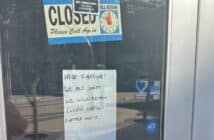
While you might not have experienced it yet, watch out for basement floods. There are a few things you can do to protect yourself, and also to replace your stuff if it gets ruined.
I learned a hard lesson recently after the big rainstorm a few weeks ago: a bunch of water got into our basement and ruined a number of boxes of my and my roommates’ things. Thankfully nothing super expensive was ruined, but it was a lot of books and CDs I’ll have to replace.
It’s a good reminder that when it rains, make sure to check and see if water got in. We thought we were fine until we found a bunch of soaked boxes in a corner.
The flood also spurred us to get a bunch of plastic bins instead of cardboard boxes (they’re $8-$12 at Target.) Then even if water gets in, odd are it won’t ruin your stuff.
Over the last few days when it rained more, I was able to spot the source of the flood. Of course your results may vary, but for us, it was clogged gutters that then caused water to pour down and find its way in. And since the gutters were clogged, it didn’t matter that we had a big downspout since no water was getting there.
The whole ordeal also showed us that we need to get renters’ insurance. It’s pretty inexpensive and covers theft, fire and more. Many basic forms of renters insurance don’t actually cover floods (as in a river overflows and floods your place), but some do cover water damage, so make sure yours does. Read more here from the government’s National Flood Insurance Program and the differences between floods and water damage.
It’s also important to dry out your basement as soon as possible when it floods as the water can attract mold or bugs, neither of which you want. The City Paper has more about mold — due to a loophole, the city can’t cite your landlord over mold. You also want to make sure there’s some kind of drain so any water can go somewhere.
Those are my unfortunately-learned lessons about basement floods. Anybody else have tips, suggestions or warnings?




